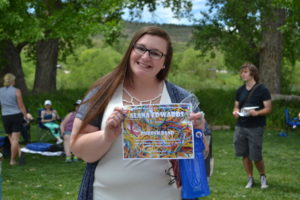Prevocational Transition Program at Foothills Gateway
March 12, 2018
In 2013, the Foothills Gateway Supported Employment program realized there was gap in the services it provided. There were the in-house prevocational work spaces, and job coaches working with individuals out in the community, but nothing in between.
That’s where the idea for the Prevocational Career Consultant position sparked. There was one major question to answer: How can we educate and excite program participants to move into community employment?
Stacey Slack, Foothills’ current Marketing and Procurement Manager, was the first to fill the essential position.
“I was told to use my creativity to offer them experience to use their knowledge in the employment world. After meeting with the participants, I learned a little more about was what hindering them from community employment,” Stacey explained.
There are three core elements she focused on while creating the transition program:
Fear & Inexperience:
Because most of the individuals working in pre-voc. have not worked outside our doors, it became clear we needed to offer opportunities to work off-site and perhaps be in a group with a friend until the initial fear passed.
Groups began volunteering at the Food Bank and Loveland Community Kitchen, as well as working at Jorgensen Labs. Thus, creating a safe space for participants to learn and grow confidence.
Soft Skill Education:
Developing interpersonal skills like hand shaking or keeping good hygiene is important for gaining and keeping community employment and maintaining professional relationships.
Trainings were developed to enhance skills like greeting supervisors or customers, dressing professionally and handling stress. Each class watches a DVD and talks about handling various situations professionally.
They also began offering mock interviews for individuals who wanted the practice. Participants dress up as if it’s a real interview and gain tips and tricks on leaving the best impression possible.
Hard Skill Education:
Budgeting and telling time are integral pieces in supporting one’s self in the community. So, specific classes where everyone can practice these skills were initiated. There are also trainings on filling out applications being responsible for your own transportation.
Transportation trainings include reading the bus schedule, planning a route, crossing streets safely, and having conversations with fellow bus riders without sharing too much information.

Alana Edwards has taken over for Stacey since her position change to bringing in work for pre-voc. Her drive stems from making dreams come true.
“We go over what their dream jobs are and do everything we can to teach the skills they need to get there,” Alana said, “My favorite part is working with local businesses to customize jobs for individuals, just like we do in Production or VSTA… creating rigs and breaking down jobs to make them more manageable.”
The biggest challenge may be walking the line of being a mentor and a boss. Participants are learning, but have to get a taste of the discipline management brings.
“We need to tell it like it is so they get a feel for what it’s like to have a boss. If they don’t get a taste of what it’s like in the real world, they can’t be successful,” Alana explained, “we work with them, get them ready, and send out our butterflies!”

 Donate
Donate